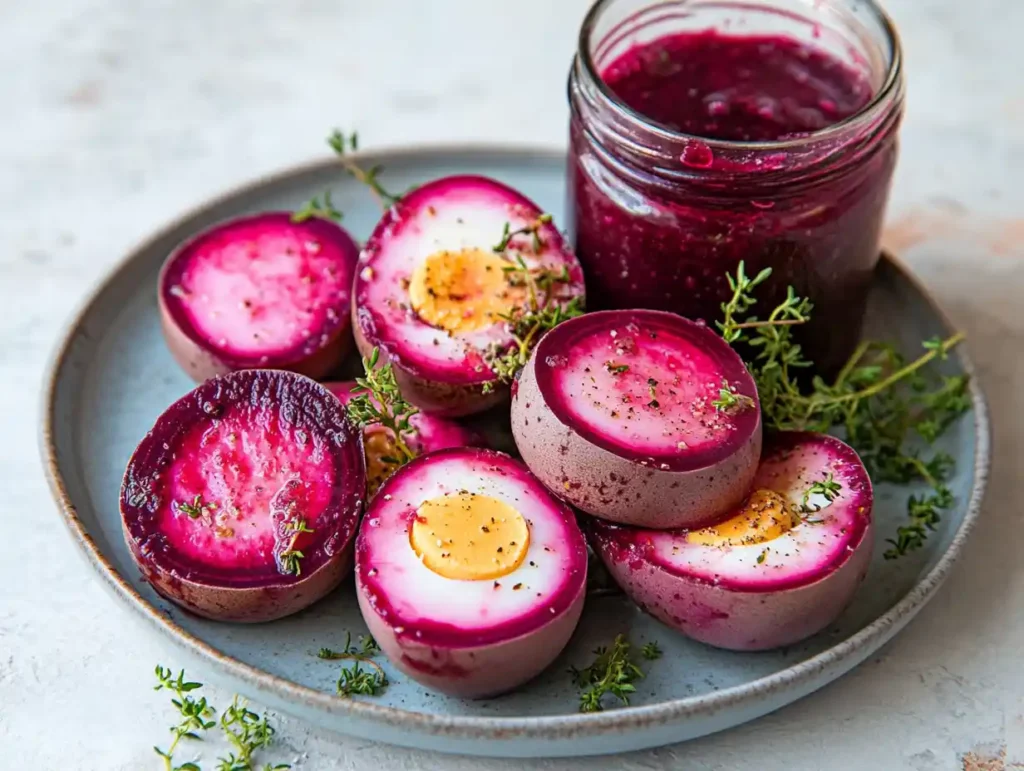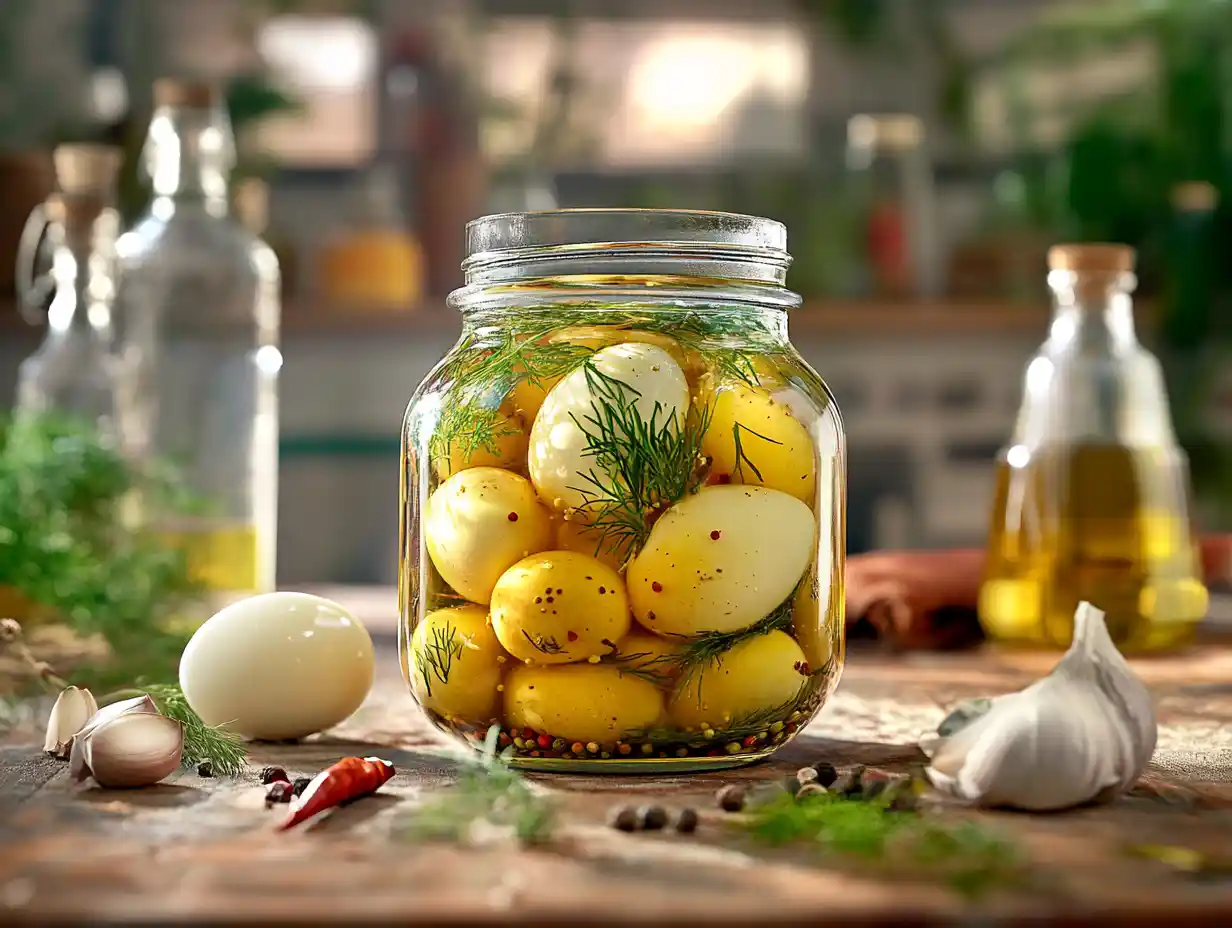Pickled eggs are a delightful treat enjoyed worldwide, prized for their tangy flavor and versatility. However, a common issue many face is rubbery-textured eggs, which can detract from their overall enjoyment. Whether you’re a seasoned pickling enthusiast or a curious beginner, understanding the nuances of achieving tender, flavorful pickled eggs is essential.
In this guide, we’ll explore why eggs can become rubbery during the pickling process, the factors contributing to this problem, and actionable tips to ensure your pickled eggs are always perfect. We’ll also share tried-and-true recipes, highlight common mistakes to avoid, and answer frequently asked questions to help you become a pickling pro.
Table of Contents
Understanding Pickled Eggs
What Are Pickled Eggs?
Pickled eggs are hard-boiled eggs soaked in a mix of vinegar, salt, and spices. People started pickling eggs to preserve them before refrigeration. Over time, they became a favorite snack and side dish in many cultures. You can enjoy them as a quick bite, in salads, or paired with sandwiches.
The process is simple. Boil the eggs, peel them, and place them in a jar filled with brine. The acidity of the vinegar prevents spoilage while adding a tangy taste. However, if you don’t follow the right steps, the eggs may develop a rubbery texture.
History and Popularity of Pickled Eggs
Pickled eggs have a long history. People in Europe and Asia made them centuries ago to keep food from spoiling. In time, they became a popular treat in pubs and homes.
Today, they come in many varieties. Some are infused with beet juice for a bold pink color. Others are spiced with chili for heat. This diversity has made pickled eggs a favorite for both chefs and home cooks.
Common Issues with Pickled Eggs
Even though pickling eggs is simple, some problems can arise. Many people find their eggs become rubbery. This often happens because the eggs were overcooked or left in the brine too long. Improper brine composition or storage can also ruin the texture. By understanding these issues, you can avoid them and enjoy perfect pickled eggs every time.
Factors That Contribute to Rubberiness
Overcooking the Eggs
Overcooking often leads to rubbery pickled eggs, a problem that is easy to avoid. When eggs boil too long, their whites become tough and chewy. This issue worsens as the acidic brine alters the proteins in the eggs. To prevent this, you should carefully time the boiling process. For example, simmer large eggs for 9 to 12 minutes, depending on your preferred level of doneness. Immediately transferring the eggs to an ice bath will also stop further cooking.
Brine Composition
The brine’s composition directly affects the texture of the eggs. If the brine is too acidic or salty, it can make the whites tough and unappealing. While vinegar is necessary for preservation, you should also add water to dilute the acidity. Moreover, using the right amount of salt and sugar ensures a balanced brine. By incorporating spices like mustard seeds or dill, you can enhance flavor without making the eggs rubbery.
Storage Duration
The amount of time eggs stay in the brine also impacts their texture. Eggs left in the solution for too long often develop a dense, rubbery texture. To avoid this, consume pickled eggs within 5 to 7 days for the best results. While it’s safe to store them for up to a month, their texture and flavor might deteriorate over time. For tender, flavorful eggs, keep track of how long they’ve been pickling.
Tips for Perfect Pickled Eggs
Step-by-Step Guide to Avoiding Rubberiness
Choosing the Right Eggs
Selecting fresh, medium-to-large eggs is crucial for achieving the best texture. Fresh eggs cook evenly and peel more easily, while cracked or old eggs may compromise the pickling process. By starting with high-quality eggs, you set the foundation for a successful result.
Cooking Eggs to Perfection
Cooking eggs correctly is one of the most critical steps. Follow these steps to ensure perfect results:
- Begin by placing the eggs in a pot and covering them with cold water.
- Gradually heat the water until it reaches a gentle boil.
- Reduce the heat to a simmer and cook the eggs for 9 to 12 minutes, depending on their size.
- After cooking, immediately transfer the eggs to an ice bath. This step not only stops further cooking but also makes peeling easier.
By following this method, you can achieve soft, tender egg whites that are perfect for pickling.
Preparing the Brine
A well-crafted brine enhances both the flavor and texture of pickled eggs. For instance, a simple brine includes 1 cup of vinegar, 1 cup of water, 2 tablespoons of salt, and optional flavorings like garlic or dill. Heat the brine gently until the salt dissolves, then let it cool completely before using. By cooling the brine, you avoid shocking the eggs and maintain their smooth texture.
Proper Storage Techniques
Storing pickled eggs correctly is essential for maintaining their quality. Always place the eggs in a glass jar with a tight seal, ensuring they are fully submerged in the brine. Rotate the jar every few days to distribute flavors evenly. Most importantly, keep the jar refrigerated at all times, as leaving it at room temperature can lead to spoilage. With proper storage, your eggs will remain fresh and flavorful.
Importance of Vinegar and Acid Balance
Vinegar plays a vital role in preserving pickled eggs, but balance is key. Excessive vinegar can toughen the egg whites, while too little may lead to spoilage. For the best results, combine vinegar and water in equal parts, then adjust to taste. Adding sugar helps counteract the sharpness of the vinegar and creates a more pleasant flavor. By carefully balancing the ingredients, you can ensure both safety and taste.
Recipes for Soft and Tender Pickled Eggs
Classic Vinegar Pickled Eggs Recipe
This timeless recipe creates flavorful, tender pickled eggs with a simple brine. It’s perfect for beginners and offers a traditional taste that pairs well with almost any dish.
Ingredients:
- 12 large hard-boiled eggs
- 1 cup white vinegar
- 1 cup water
- 2 tablespoons salt
- 1 tablespoon sugar
- 1 teaspoon mustard seeds
- 1 teaspoon black peppercorns
- 2 garlic cloves, crushed
Instructions:
- Boil the eggs, then cool and peel them.
- In a saucepan, combine vinegar, water, salt, sugar, and spices. Heat gently until the salt and sugar dissolve. Allow the brine to cool completely.
- Place the peeled eggs in a clean glass jar. Pour the cooled brine over the eggs, ensuring they are fully submerged.
- Seal the jar and refrigerate for 5 to 7 days to let the flavors develop.
- Enjoy your pickled eggs as a snack or side dish.
Beet Pickled Eggs Recipe

This recipe adds a vibrant color and earthy flavor to your pickled eggs. It’s a crowd-pleaser, especially at parties or holiday gatherings.
Ingredients:
- 12 large hard-boiled eggs
- 1 cup beet juice (from cooked or canned beets)
- 1 cup white vinegar
- ½ cup water
- 2 tablespoons sugar
- 1 tablespoon salt
- 1 small onion, thinly sliced
Instructions:
- Prepare the hard-boiled eggs and peel them.
- Mix beet juice, vinegar, water, sugar, salt, and onion slices in a saucepan. Heat gently and stir until the sugar dissolves. Let the mixture cool.
- Place the peeled eggs and cooked beets (optional) in a jar. Pour the beet brine over the eggs, ensuring they’re submerged.
- Refrigerate for at least 5 days, rotating the jar occasionally to color the eggs evenly.
- Serve as a striking addition to salads or appetizers.
Spicy Pickled Eggs Recipe

For those who enjoy a kick of heat, this recipe combines classic pickling techniques with bold flavors.
Ingredients:
- 12 large hard-boiled eggs
- 1 cup apple cider vinegar
- 1 cup water
- 1 tablespoon salt
- 1 tablespoon sugar
- 2 dried chili peppers or 1 teaspoon red pepper flakes
- 2 garlic cloves, sliced
- 1 teaspoon smoked paprika
Instructions:
- Boil and peel the eggs.
- In a saucepan, combine vinegar, water, salt, sugar, chili peppers, garlic, and paprika. Heat until the salt dissolves, then cool the brine.
- Place the eggs in a jar, and pour the spicy brine over them.
- Seal the jar and refrigerate for 5 to 7 days. For a spicier flavor, allow the eggs to marinate longer.
- Enjoy your eggs as a fiery snack or a flavorful addition to meals.
Common Mistakes to Avoid
Using the Wrong Type of Eggs
Choosing poor-quality or old eggs can lead to uneven pickling and an unpleasant texture. Fresh, large eggs work best because they hold up well during boiling and absorb the brine evenly. Always check for cracks before using eggs to avoid spoilage.
Ignoring the Cooling Process
Skipping the cooling step after boiling eggs often results in overcooking. This can make the whites tough before they even touch the brine. To avoid this, transfer the eggs to an ice bath immediately after boiling. Cooling also makes peeling easier, which is essential for smooth, evenly pickled eggs.
Storing Eggs for Too Long
Over-pickling can ruin the texture of your eggs. While it’s tempting to leave them in the brine for weeks, eggs develop a rubbery consistency if pickled for too long. Always consume pickled eggs within a month and aim for the peak flavor period of 5 to 7 days.
FAQs About Pickled Eggs
HWhat Is the Best Vinegar for Pickling Eggs?
White vinegar is the most common choice for pickling eggs because it has a neutral flavor and doesn’t alter the brine’s color. However, you can use apple cider vinegar for a slightly sweeter taste or malt vinegar for a more robust flavor. Each type of vinegar offers unique characteristics, so choose one that complements your recipe.
How Long Should You Pickle Eggs Before Eating?
For the best flavor, let pickled eggs marinate in the brine for at least 5 days. This gives the vinegar and spices enough time to penetrate the eggs fully. If you prefer a stronger flavor, you can let them sit for up to 7 days. After this period, the eggs are ready to enjoy, but consume them within a month for the best texture.
Can You Pickle Eggs Without Vinegar?
While vinegar is the most common acidic ingredient for pickling, it’s possible to use alternatives like lemon juice. However, vinegar is preferred because it ensures better preservation and a consistent flavor. If you choose not to use vinegar, be mindful of the eggs’ shorter shelf life and store them properly.
How Do You Store Pickled Eggs Safely?
Always store pickled eggs in the refrigerator. Ensure the eggs are completely submerged in the brine, as this prevents spoilage and ensures even pickling. Use a clean, airtight glass jar to avoid contamination, and label the jar with the pickling date to keep track of freshness.
Can You Reuse the Pickling Brine?
While it’s tempting to reuse leftover brine, it’s not recommended for safety reasons. The eggs release moisture and protein into the brine, which can encourage bacterial growth over time. If you want to pickle another batch, make a fresh brine to ensure safety and flavor.
How Do You Add Flavor to Pickled Eggs?
You can customize the flavor of pickled eggs by experimenting with spices, herbs, and aromatics. Adding ingredients like garlic, onion, dill, chili peppers, or bay leaves enhances the brine’s complexity. For a unique twist, try adding beet juice for sweetness or smoked paprika for depth.
Conclusion
Making tender, flavorful pickled eggs requires attention to detail but is well worth the effort. By avoiding common pitfalls like overcooking, balancing your brine, and following proper storage practices, you can create a delicious snack that’s far from rubbery. Whether you prefer the simplicity of a classic recipe or the boldness of spicy variations, pickled eggs are a versatile treat that’s easy to enjoy.
With this comprehensive guide, you now have the knowledge to make perfect pickled eggs every time. Experiment with different recipes, share them with friends, and enjoy the satisfying process of mastering this timeless culinary art.
For more tips, check out our Spicy Pickled Eggs Recipe for a flavorful twist. Wondering how long pickled eggs last? Explore our guide on How Long Do Pickled Eggs Last in Vinegar. Lastly, learn the perfect timing for consumption with How Long Should Eggs Be Pickled Before Eating.

